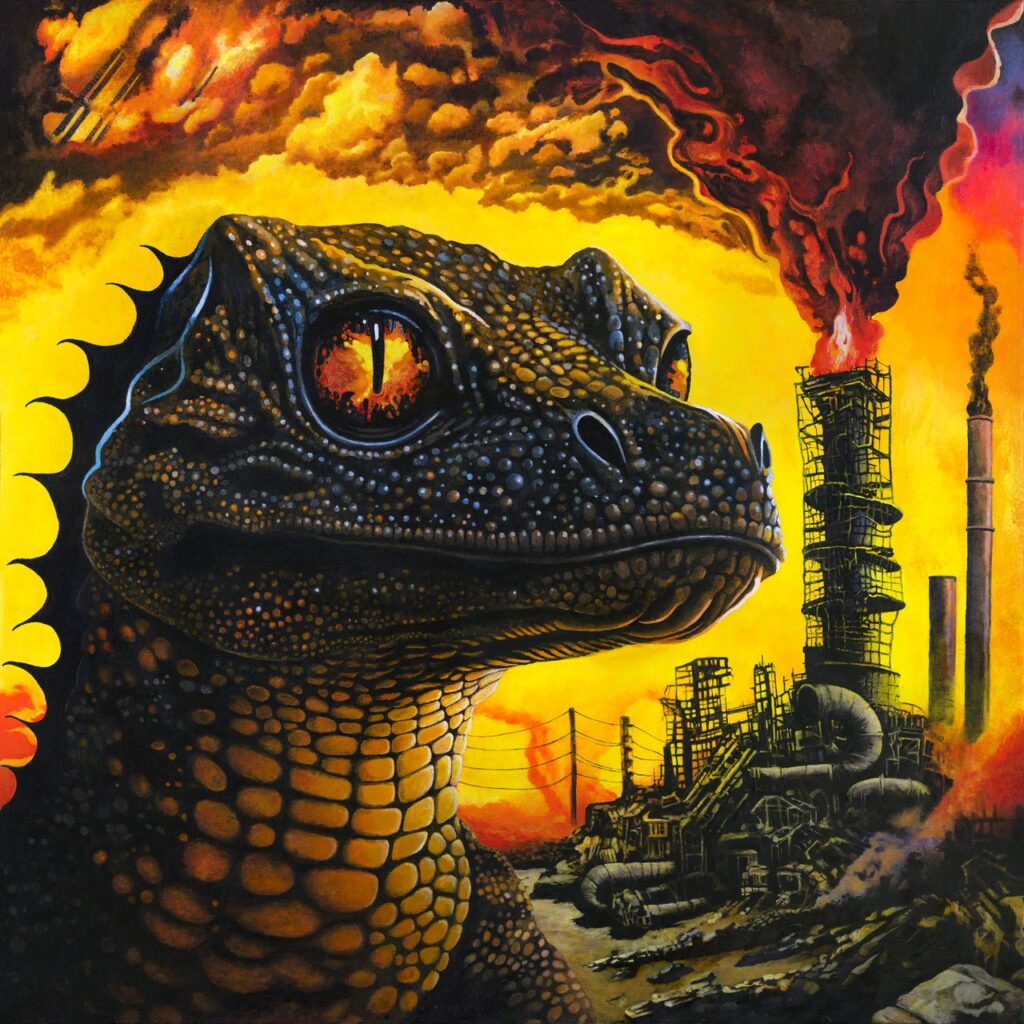A melodic motif emerges a few minutes into PetroDragonic Apocalypse; or, Dawn of Eternal Night: An Annihilation of Planet Earth and the Beginning of Merciless Damnation, the 24th studio album by the olympically prolific Australian rockers King Gizzard & the Lizard Wizard. A descending lead guitar flits across proggy opener “Motor Spirit” for just a few seconds, like a passing thought, and then, three tracks later, re-emerges as the theme of the more straightforward “Witchcraft.” The band has pulled off this trick before, to extremely fun effect. On their mid-pandemic companion albums K.G. and L.W., a lurching fipple fanfare started things off like the tattered end of thread on a spool and proceeded to spin around for well over an hour, changing color, never breaking. By the middle of the sprawling statement, the riff suggested outlandish associations—vaseline-smeared hammered dulcimer, Bollywood-biting Backstreet Boys—before landing, organically, on the same simple melody where it started.
If K.G. and L.W. are what it sounds like when King Gizzard’s constant-motion-as-muse approach works perfectly, then PetroDragon Apocalypse is the flip side: the odd dud that comes from never letting up. A spiritual continuation of their thrash-dabbling 2019 album Infest the Rat’s Nest, PetroDragon takes their thrash- and speed-metal worship one big step backward: a goofily operatic crash makeover that’s fun for maybe one spin but offers few reasons to revisit. It’s an unfortunately one-note album, even though it technically contains so, so many notes.
Where Infest at least took an earnest stab at paying homage to the band members’ teenage metal heroes, tracing yet another new identity with originality and some grippingly gritty highlights, PetroDragon Apocalypse dive-bombs into outright camp. On “Supercell,” frontman Stu Mackenzie growls out a first verse with several vague allusions to The Wizard of Oz, then delivers a biblical second verse before a call-and-response chorus propelled by a double kick drum coasts through a few times, uninspired. The very next track, “Converge,” does much of the same, with Mackenzie’s vocals once again clinging to various monotones for several measures on end, directing attention to the obligatory falsetto wails and blast beats. All of that happens before “Gila Monster,” the baldly incoherent story’s introduction of the beast and the least serious track of all, in which Mackenzie rhymes “I’m the gila” with “Godzilla guerilla,” among other shards of psychobabble, before the song ends on a boilerplate-y (though still impressive) speed solo.
On the last two tracks, which each stretch for more than nine minutes, King Gizzard finally flex their talent for switching things up and catching you off guard, instead of just brandishing their metal bona fides. “Flamethrower,” the album’s closer, ends by briefly and intriguingly imagining a thrash album that’s both blippy and sinister, but it’s too little, too late for PetroDragon Apocalypse. The whole thing might be the soundtrack to the Star Trek: A Klingon Challenge Interactive VCR Board Game. It sounds like what Buzz McCallister was rocking out to while feeding his tarantula.
Despite its razzle-dazzle, this is the rare King Gizzard release that actually sounds like it was composed as quickly as it was. According to singer and bandleader Stu MacKenzie, the narrative arc of PetroDragon and even the song titles came first; each of the album’s seven songs was then co-written from scratch in a day. “I guess we kind of made the record backwards,” he said, explaining, “It’s about humankind and it’s about planet Earth but it’s also about witches and dragons and shit.” By its very nature, a thrash concept album requires some suspension of intolerance for the overwrought, but give me the ones that go all-in on their concepts over one that makes me feel like I’m supposed to be smirking along. King Gizzard might have copped out this time, but such a misstep has little bearing on whether their next one will hit its mark: Their whole m.o. is to never stay in one place for longer than a blink—and part of that entails motoring through the occasional, inevitable miss.
All products featured on Pitchfork are independently selected by our editors. However, when you buy something through our retail links, we may earn an affiliate commission.

